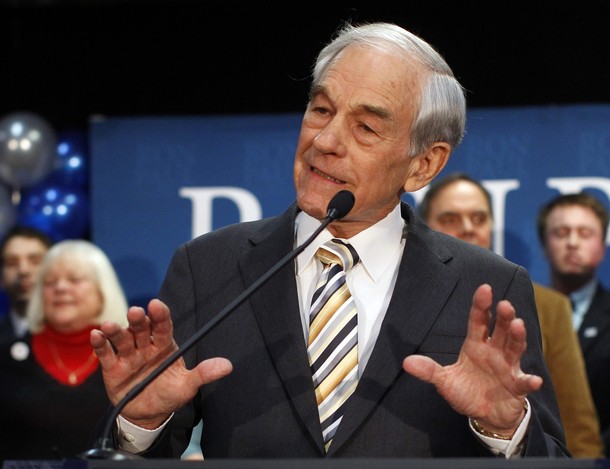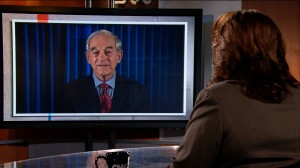Ron Paul calls social conservatism a "losing position" for Republicans

On CNN's State of the Union with Candy Crowley Sunday, Republican presidential candidate Ron Paul ripped into former Senator Rick Santorum's voting record as well as his campaign rhetoric, calling social conservatism "a losing position" for the Republican Party going into the November general election against President Barack Obama.
The twelve-term Republican Congressman from Texas, known for his independent voting record and libertarian political philosophy, argued that there are bigger and more urgent issues at stake, issues that will resonate more with American voters concerned about our nation's future. Paul said:
"I'm worried about undermining our civil liberties, the constant wars going on, the debt of $16 trillion. They are worried about birth control pills."
When asked point blank by Candy Crowley: "Are you uncomfortable with this talk about social issues? Do you consider it a winning area for Republicans in November?" Paul replied, "No. I think it's a losing position."
Is Ron Paul right? Will the emphasis on social issues derail the GOP's attempt to win the White House? Back in 2004 before the economy crashed and burned, social issues and ballot propositions to define marriage were a key part of Karl Rove's strategy to win Bush a second term-- and it worked. But as another strategist across the aisle famously said, "It's the economy, stupid." When Americans are worried about putting food on the table and paying the bills, it's suddenly less important to obsess over everybody else's sexuality and culture.
In the anonymously-written exposé on the Tea Party published by Playboy back in the Summer of 2010, the author, who claimed to be an insider and consultant for Tea Party groups, welcomed the protest movement's focus on economic and fiscal policy issues. They argued it was much easier to write a sarcastic letter to voters from a Wall Street executive to thank them for the bailout their congressman helped pass than to send them a tract explaining why two men who love each other shouldn't be able to marry. If that anonymous consultant is still at work writing campaign literature, he or she would probably nod in agreement with Ron Paul: in post-Tea Party, mid-recession America, social issues are still a losing battle for conservatives, and the numbers prove it.
Last year, support for legalizing gay marriage reached an all-time high in America, with 64% of respondents saying gay or lesbian relations between consenting adults should be legal. 73% of the coveted Independent vote said gay marriage should be legal, a statistical tie with Democrats who supported legalizing gay marriage by 75%. Republicans, meanwhile, were out-of-sync with Independents and Democrats, with only 41% supporting legal gay marriage. A few months before that, 67% of American voters said they supported a repeal of Don't Ask, Don't Tell so that gays and lesbians could serve openly in the military, with 70% of Independents supporting the repeal. Just this week, 54% of respondents in a Rasmussen poll said that women in the military should be able to serve in full combat roles, a position that Rick Santorum opposed as the DOD moved to allow women in combat roles.
Sexuality isn't the only social issue where Republicans aren't likely to charm voters, especially Independent voters, with their own version of the "nanny-state" that they otherwise purport to oppose. Late last year, the Independent Voter Network reported that a record 50% of voters now support legalizing marijuana, the largest ever percentage since Gallup started asking the question in 1969, noting that:
"Gallup‘s figures through the decade suggest an exponential growth in the percentage of legalization advocates, which has promising implications for the legalization movement over the next decade. It took ten years for the percentage of legalization supporters to jump ten percent from 30% to 40%, and only two years to jump another ten percent to Gallup‘s most recent figure."
How would Republicans do if they focused on economic issues and fiscal policy, seen to many as a growing entitlement state and bloated bureaucracy? This month, 63% of voters said cutting the federal payroll would be better for the economy than giving federal workers a modest pay raise. Only 18% said the latter option would be better for the economy. Yesterday, Rasmussen reported that a majority of 53% of Americans support repealing the controversial health care law pejoratively called "ObamaCare" by its critics. We also learned more Americans than ever hold a favorable view of Ford, the one "Big Three" automaker to turn down federal bailout money at the height of the financial crisis, and that Ford still holds its favorability lead over Chrysler and GM, who got bailed out.
And finally, of all recent presidents going back to Richard Nixon, Americans rate Ronald Reagan and Bill Clinton as the first and second best, respectively. This could likely indicate a yearning for the relatively stronger economic times and more modest reach, role, and price tag of the federal government. George W. Bush, ranked second worst, indicating that the social conservatism and open-ended wars of the Bush years aren't so appealing to voters now. If defeating Obama in November is the single most important priority for the GOP, as so many Republican leaders have continued to repeat, running on a platform of social issues is not likely to woo voters especially not Independents.





